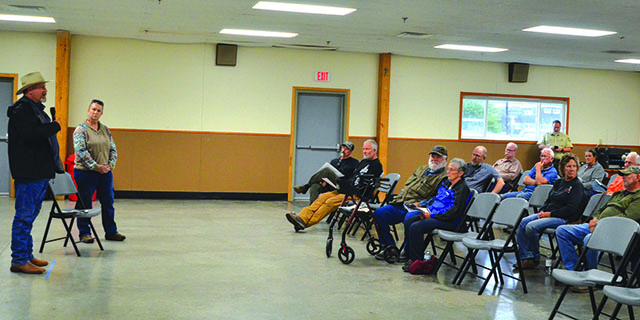Frustrated with perceived disrespect, Umatilla mayor sues his own city
Published 8:43 am Monday, June 2, 2025

- The city of Umatilla's new sign greets motorists driving past the intersection of highways 395 and 730. Umatilla Mayor Caden Sipe on March 20, 2025, filed a federal lawsuit against the city he was elected to represent. (City of Umatilla/Contributed Photo, File)
Mayor Caden Sipe says the city violated his First and 14th amendment rights by censuring him, among other accusations
UMATILLA — A conflict between Umatilla’s mayor, city manager and city council that spilled into public view late last year has dramatically escalated, with Mayor Caden Sipe now suing the very city he was elected to represent.
In the federal lawsuit, Sipe’s attorneys detailed the lengths he said he would go to thwart City Manager David Stockdale’s proposal for a new police station.
“Plaintiff … said something to the effect that if a general obligation bond was submitted to voters, he would be the first to put up a yard sign advocating a ‘no’ vote on the measure,” the complaint states.
Trending
Dispute over the proposed police station is at the center of Sipe’s lawsuit, which alleges Stockdale and every member of the Umatilla City Council violated his First Amendment right to free speech and due process laws guaranteed by the 14th Amendment by limiting his access to the city staff and censuring him, among other accusations.
Sipe has opposed an effort to raise money for the police station from the start — a move in line with Umatilla voters, who handily rejected the $19.8 million bond when it went up for election on May 20. Sipe’s lawsuit predated that public rebuke and was filed in March.
Sipe is not only seeking a declaration that the city violated his rights and an injunction against further “retaliation,” but also financial compensation in the form of attorney fees and unspecified damages.
As both sides prepare to go to court, the political future of the town of 7,500 people is uncertain.
Conflict from the start
The Umatilla City Council censured Sipe in January after accusing him of repeatedly undermining Stockdale’s authority. But according to the lawsuit, the root of Sipe and Stockdale’s disagreements stretched all the way back to 2022, after Sipe was elected mayor.
The complaint states that Sipe heard Stockdale was spreading a rumor that he did not meet the residency requirement to serve as mayor. Sipe met with Stockdale and told him the rumor was untrue and encouraged him to speak to him directly if he had any questions.
Trending
The relationship between the two did not improve after Sipe took office in 2023. Their interactions fell into a pattern: Sipe would push Stockdale for answers on various local issues and policies, and Stockdale would push back by saying Sipe was overstepping his authority as mayor. Like most rural Oregon towns, Umatilla’s mayoral position mostly acts as a figurehead — the position does not have a vote in most city council situations and leaves day-to-day administration of the city to its manager. But the lawsuit states that Sipe felt Stockdale was trying to limit his authority to oversee the city manager and set the agenda.
Their conflict escalated further in February after Stockdale emailed Sipe to suggest meeting for lunch regularly since they had “gotten off on the wrong foot.” According to the lawsuit, Sipe found the email “frustrating” since he had proposed similar meetings in the past “to no avail.”
Instead of directly responding to Stockdale, Sipe reached out to several councilors to complain about the city manager. Sipe contacted lawyers with the city and the insurance arm of the League of Oregon Cities with similar complaints.
Neither effort went Sipe’s way. The lawyers eventually declined to advise Sipe, leading him to hire his own attorneys. When word got back to Stockdale, he accused Sipe of violating city council rules and state public meeting laws. After meeting, the rest of council sided with Stockdale in the conflict
Sipe and Stockdale continued to clash through 2023 and 2024, with the council often meeting in closed-door executive sessions to try to resolve the issues. By December 2024, the council was holding open meetings to consider complaints made by Stockdale that alleged Sipe had repeatedly undermined the city manager. In January, the council censured Sipe, prohibiting him from representing the city without the permission of the city manager or city council, among other restrictions.
While some councilors said they were optimistic about moving past the censure, Sipe said in interviews that he was considering legal action. He followed through in March with the lawsuit.
According to the complaint, the source of Stockdale and the city council’s opposition to Sipe amounted to age discrimination. Sipe is 28 years old.
“Although Defendants treated each other like adults, they consistently treated Plaintiff like a child and made comments about his ‘inexperience’ … Defendants were generally resistant to, and resentful of, Plaintiff leading council meetings, setting the agenda, and performing his mayoral duties,” the lawsuit states.
The attorneys for the city of Umatilla, the individual members of the city council and Stockdale did not return calls requesting comment.
A family affair
In 2024, Stockdale told the city council that he was concerned Sipe’s family and personal interests were affecting the way he governed.
“If I’m sitting in meetings with partners, customers, potential clients,” he said, “and the work that I’m doing is being undercut by discussions that are occurring, you’re setting me up for failure.”
Sipe is the son of Heidi Sipe, the prominent and influential superintendent of the Umatilla School District. Sipe works as a teacher in the district with his father, Kyle Sipe, who is also the chair of the Umatilla Rural Fire Protection District.
In the lawsuit, Sipe acknowledged his familial connections but dismissed any accusations of conflicts of interest. During a March 2024 city council meeting, Sipe advocated for more funds from the local enterprise zone go to the school district. At a different meeting a few months later, Sipe admitted that he didn’t defend the city when representatives, “some of whom were his family members,” called the enterprise zone funding formula “immoral.” He agreed the formula was problematic, but added that he wasn’t commenting as the mayor.
According to the lawsuit, the Oregon Government Ethics Commission advised Sipe that he did not need to declare a conflict of interest because his employer was not a business. He also pointed to the defendants’ own ethical lapses, including a city councilor failing to declare a conflict of interest.









